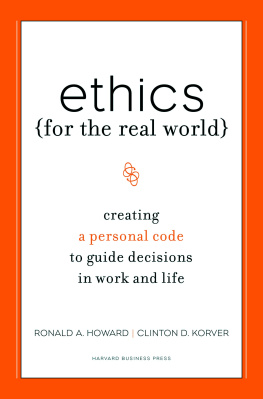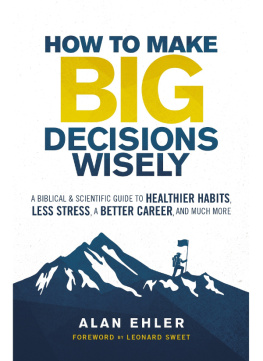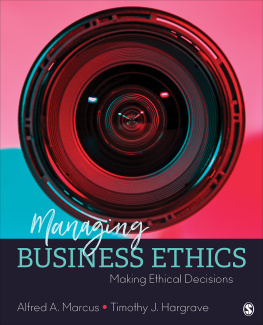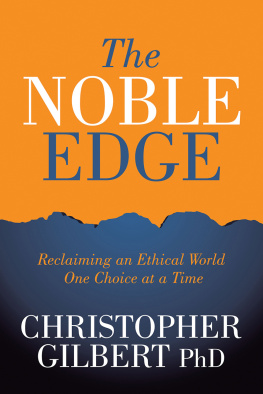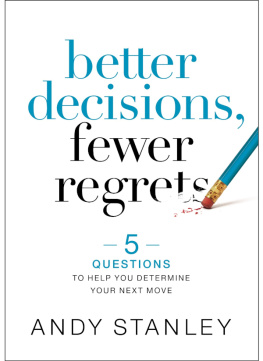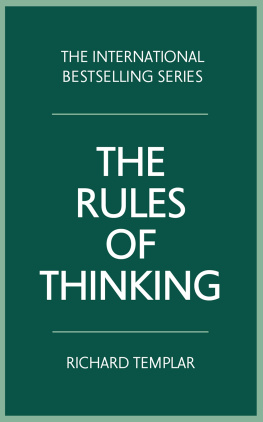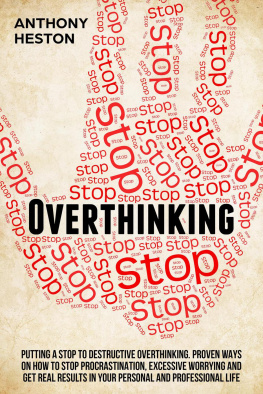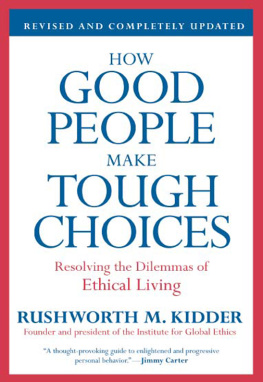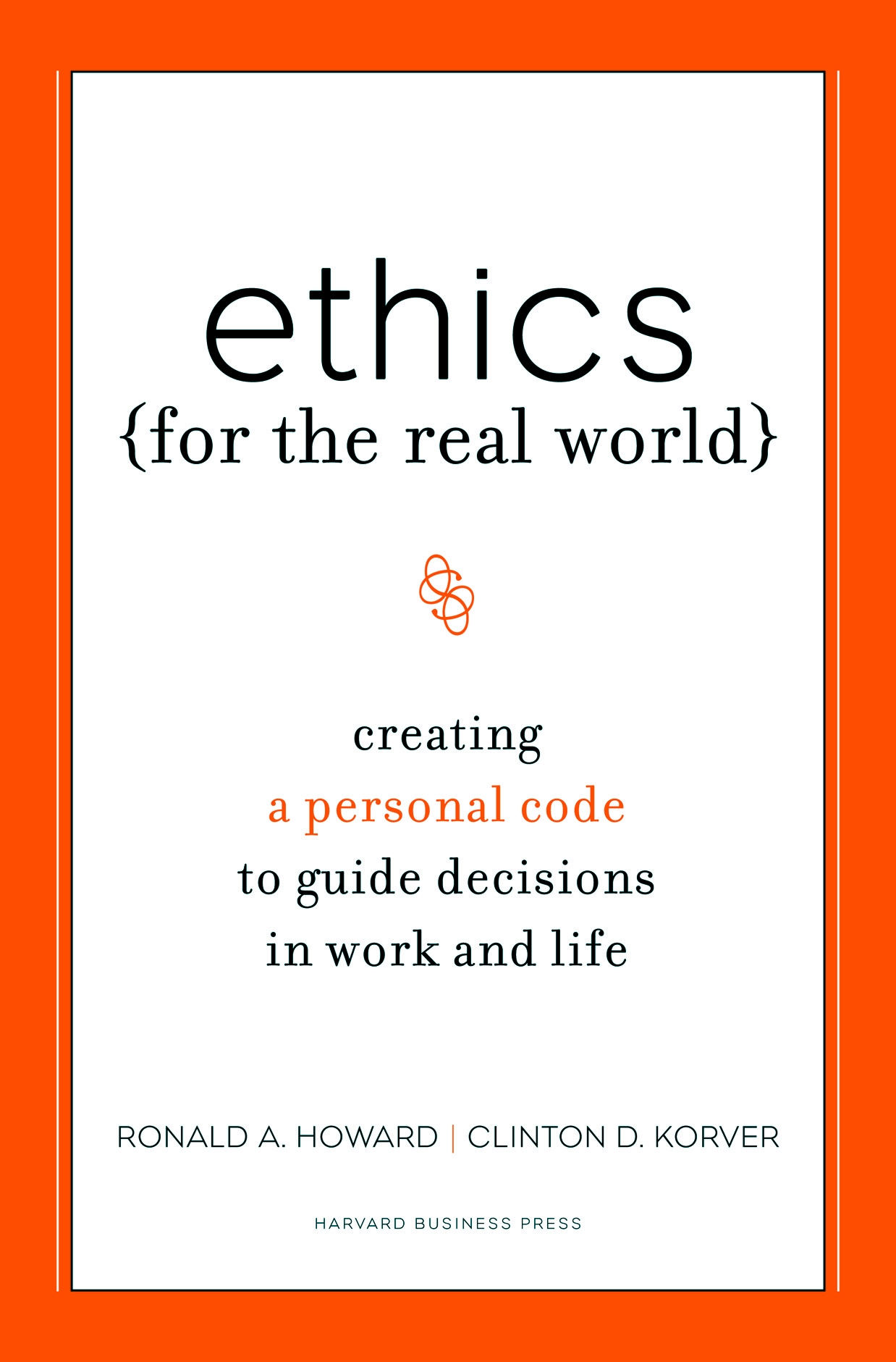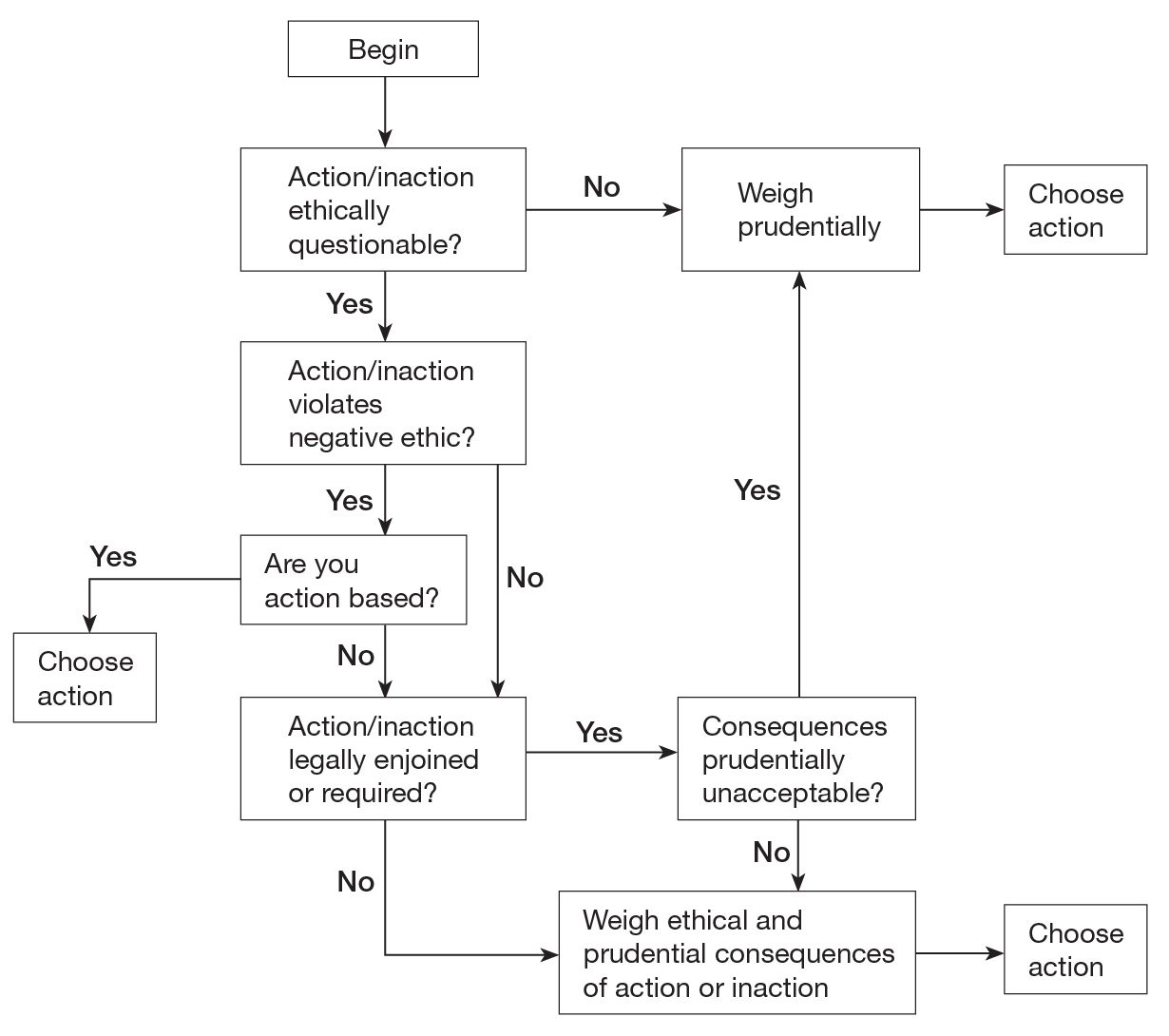ACKNOWLEDGMENTS
We would like to thank our many great students over the last few decades. In particular, we would like to thank those who gave us permission to use their personal examples in this book: Omar A. Al-Saif, Mike Boutross, Deepti Chatti, Megan Goering, David Huynh, Jessie Juusola, Boyi Low, Junayd Mahmood, Somik Raha, Cliff Redeker, Chester Shiu, Will Tang, Jonathan Yi-Kwang Teo, and Neal Vora.
We would also like to thank Bill Birchard, our writer. Bill did an excellent job helping us to convert material optimized for a Socratic approach to teaching ethics to graduate students to a form accessible to a much broader audience. He also managed our project with a skilled and firm hand. With his help, we kept to a schedule and delivered a completed manuscript on time.
We would like to thank our agent, Helen Rees, who helped us find a home for the book. Our editor at Harvard Business Press, Jacque Murphy, then pushed us to make the book better, and we appreciate her comments and insight.
There have been many others who have meaningfully contributed to this project, including Charles Anderson, CEO, United Way of the National Capital Area; Ibrahim Mojel, Rons teaching assistant for his ethics class over the last few years; four anonymous reviewers; and the team at Harvard Business Press.
We would like to separately thank people important to each of our efforts.
Ron Howard
The foundations of this book go back thirty years, to a time when I realized my work on improving human decisions was essentially amoral. When and whether to use tools like a computer, for example, would often have ethical implications. It was my responsibility to provide students with a means of increasing their ethical sensitivity. The graduate course that resulted has benefited from many contributions from many others, not only from students, but also from the dozens of teaching assistants who have continually improved the quality of the experience. I thank them all.
While I had often thought of writing this book, I thank Clint Korver for the energy and enthusiasm that made it possible: Clints contributions appear in every aspect of content and form. If a teacher is known by his students, I could not be better known.
Clint Korver
I would like to thank my wife, Miriam Rivera, for her insights into how to Tell the Whole Truth in more useful ways. Miriam contributed to this book in many big and small ways. More important, I would like to thank her for helping me live a life consistent with my ethical code. I would also like to thank my two daughters, Serena Rivera-Korver and Sophia Rivera-Korver, for the happy faces and whiteboard love notes that made the evening and weekend work on this book more pleasurable. I would also like to thank my parents and sister for creating an ethical touchstone that has served me well throughout my life.
Finally, I would like to thank my friend, coauthor, and teacher, Ron Howard. In addition to teaching me the tools of my profession, Ron has provided an example of how to live a meaningful life.
APPENDIX A
The Elements of Ethical Thinking
How the Decision Flows
F OR A GRAPHICAL SUMMARY of the key distinctions enabling skillful ethical thinking, see . Note how the distinctions work together. Do not use the figure to guide individual decisions. Instead, use it to guide the flow of your logic, depending on a decisions characteristics. These distinctions, unique to ethical reasoning, appear over and over in this book.
The figure hints at the consequences of confusing the dimensions of a decision. Consider the common mistake, mentioned in chapter 2, of putting prudential actions in the ethical bucket. If we do so, we mistakenly go through a long decision-making process (top to bottom on the chart) instead of a short one (left to right).
The critical elements of ethical thinking
APPENDIX B
Ethical Codes
Three Examples
O N THE FOLLOWING PAGES are the texts of three ethical codes written by three students who followed the advice in this book. The students produced these codes as a part of either Ron Howards course at Stanford University or Clint Korvers course at Grinnell College. We have changed the students names to protect their privacy, and we have edited the codes lightly to make them suitable for publication.
These are not model or textbook codes. They are long and not always eloquent. But publishing the perfect code would give a misleading idea about the way codes turn out in real life. Whats important is that the codes allow each person to address personally important issues at a particular moment in their life. The codes represent a journey of personal reflection, a journey necessary for skillful ethical decision making.
For a helpful exercise (suggested at the end of chapter 4), review and annotate these codes to show where they clearly follow or diverge from the advice in this book. Then turn back to your own code, and with the benefit of this added reflection, refine your code.
Megan GerberEthical Code
Ideologically, I am uncomfortable with utilitarianism and consequence-based ethics as underlying frameworks for evaluating truth. In my view, rational implementation of these perspectives requires perfect informationin reality, an unrealistic and rare conditionand the ability to make trade-offs between different considerations (like life, trust, and liberty). I do not feel equipped to make these decisions.
Logically, this would indicate that my entire code should find basis in action-based ethics. Unfortunately, not every part of my life, personality, or reality is entirely logical. While I have used action-based ethics as a guideline for the content herein, I have not yet discerned how to eliminate consequences entirely from ethical considerations. In these sections, my challenge was to reconcile these competing interests in order to create a model that is real for now. As I continue to test these tenets against time and experience, I will continue refining the guidelines and examples below.
Lying
I will strive always to be honest, straightforward, and frank with those around me.
I will strive to communicate with others in a way that enables and empowers them to make informed decisions.
I will work to detect biases in my own mind-set in order to improve the completeness of truths I relay to others.
I will respect the rights of other people to form their own opinions and decisions based on facts they gather from me or from other sources. I will not manipulate these outcomes.
I will strive to tell complete truths when situations are immediately relevant to those around me.
I will not deliberately withhold relevant information from a person when it is immediately relevant to her.
In situations where the circumstances are not time-sensitive, I may wait to reveal additional information until a time when it is immediately pertinent.
I will not withhold part of the truth in order to personally profit from anothers ignorance.
In no case will I allow the behavior of others to affect my will to tell the truth.
If others abuse my honesty, I will decrease my trust in proportion to the violation.
I will not lie to anyone based on past breaches of my trust. In adjusting my forthrightness, I will withhold entire truths, not mere parts. This will allow me to use caution when divulging information while still striving to communicate all sides of relevant issues.

